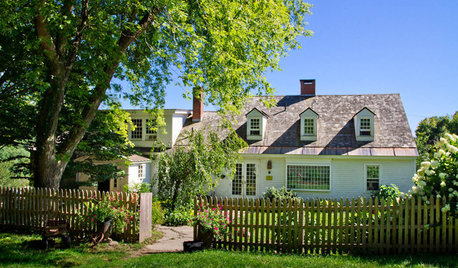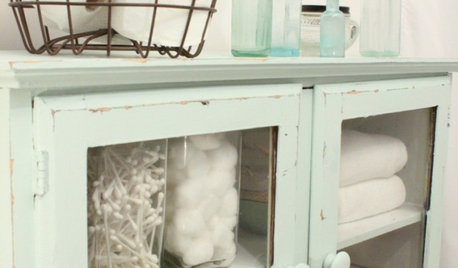OT Peculiar Family Sayings
friedag
9 years ago
Related Stories

HOUZZ TOURSHouzz Tour: Farm Fresh
Updates bring back the bygone charm of a 19th-century Texas farmhouse, while making it work for a family of 6
Full Story
MOST POPULAR5 Ways to Pare Down Your Stuff — Before It Gets in the Door
Want to free up some room around the house? Rethink gift giving, give yourself a shopping mantra and just say, ‘No, thank you’ to freebies
Full Story
HOUZZ TOURSMy Houzz: A Basic Builder Home Gets the Glam Treatment
From blank canvas to decorated beauty, this home in Massachusetts changed a family's life in more ways than one
Full Story
HOUZZ TOURSHouzz Tour: From Garage to Play Pavilion in Seattle
An active Washington state family encourages creative and athletic play by transforming a garage into a multipurpose gym-style pavilion
Full Story
ROOM OF THE DAYRoom of the Day: Great Room Solves an Awkward Interior
The walls come down in a chopped-up Eichler interior, and a family gains space and light
Full Story
LIFEThe Beautiful Thing About Dad's Chair
My father had his own spot in the house. His father had his own spot. Now I have mine
Full Story
LIFECreate a 'Forever House' Connection
Making beautiful memories and embracing your space can help you feel happy in your home — even if you know you'll move one day
Full Story
HOUZZ TOURSHouzz Tour: Modern Warmth for a Lake Superior Getaway
Wood and glass aplenty help a lakeside vacation home reflect its surroundings while opening to the view
Full Story
LIFEDecluttering — How to Get the Help You Need
Don't worry if you can't shed stuff and organize alone; help is at your disposal
Full Story
GREAT HOME PROJECTSPower to the People: Outlets Right Where You Want Them
No more crawling and craning. With outlets in furniture, drawers and cabinets, access to power has never been easier
Full Story


friedagOriginal Author
woodnymph2_gw
Related Discussions
OT: Family Heirloom plants?
Q
My peculiar screen name
Q
Is this peculiar or not?
Q
OT A new 4 legged addition to the family?
Q
carolyn_ky
friedagOriginal Author
annpanagain
friedagOriginal Author
Kath
annpanagain
friedagOriginal Author
Kath
martin_z
vee_new
annpanagain
friedagOriginal Author
vee_new
annpanagain
friedagOriginal Author
annpanagain
vee_new
annpanagain
woodnymph2_gw
friedagOriginal Author
woodnymph2_gw
vee_new
annpanagain
carolyn_ky
annpanagain
woodnymph2_gw
friedagOriginal Author
vee_new
friedagOriginal Author
annpanagain
Kath
friedagOriginal Author
Kath
annpanagain
vee_new
annpanagain
vee_new
annpanagain
annpanagain
friedagOriginal Author
friedagOriginal Author
annpanagain
annpanagain
carolyn_ky
mariannese
friedagOriginal Author
mariannese
annpanagain